Each year, from September 15 to October 15, we observe Latinx/é Heritage Heritage Month, a time to recognize and celebrate the contributions of Latinx/é Americans. At the CSUN University Library, this month is dedicated to honoring the cultural history and lived experiences of communities with roots in Mexico, the Caribbean, Central America, and South America.
The chosen dates carry special significance, as they encompass the independence days of several Latin American nations. This period also includes Día de la Raza on October 12, a day that has shifted in meaning over time. Rather than commemorating Columbus’ arrival, Día de la Raza now serves as a celebration of Indigenous peoples and cultures across Latin America.
Below, you will find a selection of eBooks freely available through the University Library that explore the experiences of Latinx/é communities with a spotlight on immigration, diaspora, displacement, transnationalism and other complex migratory processes. For even more books uplifting Latinx voices and immigrant experiences, be sure to visit our book display in the first floor of the University Library. At the end of this blog post, you will also find information about events in the library for Latinx/é Heritage Month.
Recommended eBooks
 “Geographies of Relation demonstrates how examining texts created throughout the Americas about diaspora and borderlands offers a lens to think about representations of race, ethnicity, and gender. Theresa Delgadillo crosses interdisciplinary and canonical borders to investigate the interrelationships of African-descended, Latinx and mestizx peoples through an analysis of Latin American, Latinx, and African American literature, film, and performance. Not only does Delgadillo offer a rare extended analysis of Black Latinidades in Chicanx literature and theory, but she also considers over a century’s worth of literary, cinematic, and performative texts to support her argument about the significance of these cultural sites and overlaps.”
“Geographies of Relation demonstrates how examining texts created throughout the Americas about diaspora and borderlands offers a lens to think about representations of race, ethnicity, and gender. Theresa Delgadillo crosses interdisciplinary and canonical borders to investigate the interrelationships of African-descended, Latinx and mestizx peoples through an analysis of Latin American, Latinx, and African American literature, film, and performance. Not only does Delgadillo offer a rare extended analysis of Black Latinidades in Chicanx literature and theory, but she also considers over a century’s worth of literary, cinematic, and performative texts to support her argument about the significance of these cultural sites and overlaps.” “U.S. immigration policy has deeply racist roots. From his rhetoric to his policies, President Donald Trump has continued this tradition, most notoriously through his border wall, migrant family separation, and child detention measures. But who exactly supports these practices and what factors drive their opinions? Our research reveals that racial attitudes are fundamental to understanding who backs the president’s most punitive immigration policies. We find that whites who feel culturally threatened by Latinos, who harbor racially resentful sentiments, and who fear a future in which the United States will be a majority-minority country, are among the most likely to support Trump’s actions on immigration. We argue that while the President’s policies are unpopular with the majority of Americans, Trump has grounded his political agenda and 2020 reelection bid on his ability to politically mobilize the most racially conservative segment of whites who back his draconian immigration enforcement measures.”
“U.S. immigration policy has deeply racist roots. From his rhetoric to his policies, President Donald Trump has continued this tradition, most notoriously through his border wall, migrant family separation, and child detention measures. But who exactly supports these practices and what factors drive their opinions? Our research reveals that racial attitudes are fundamental to understanding who backs the president’s most punitive immigration policies. We find that whites who feel culturally threatened by Latinos, who harbor racially resentful sentiments, and who fear a future in which the United States will be a majority-minority country, are among the most likely to support Trump’s actions on immigration. We argue that while the President’s policies are unpopular with the majority of Americans, Trump has grounded his political agenda and 2020 reelection bid on his ability to politically mobilize the most racially conservative segment of whites who back his draconian immigration enforcement measures.” “This book examines how immigration law impacts U.S. immigrant families. It addresses how admission and border policies shape family formation and contribute to prolonged family separation; how immigration enforcement affects parenting practices; and how immigrants’ unique challenges spill over to influence broader kinship support networks. Chapters describe family reunification and separation policies; return migration and binational family life; how young immigrants reconnect with family abroad and navigate romantic relationships in the United States; parents’ engagement with surveilling actors and institutions; the impact of immigration policy on parenting, including during the pandemic; the health and well-being of DACA (Deferred Action for Childhood Arrivals)-eligible adults and their children; aging and family dynamics among Asian immigrant families; and the impact of immigrant legal status across generations. Finally, the volume offers recommendations for family researchers on ways to advance our understanding of the short and longer-term effects of immigration law and policies on the formation, structure, and functioning of immigrant families.”
“This book examines how immigration law impacts U.S. immigrant families. It addresses how admission and border policies shape family formation and contribute to prolonged family separation; how immigration enforcement affects parenting practices; and how immigrants’ unique challenges spill over to influence broader kinship support networks. Chapters describe family reunification and separation policies; return migration and binational family life; how young immigrants reconnect with family abroad and navigate romantic relationships in the United States; parents’ engagement with surveilling actors and institutions; the impact of immigration policy on parenting, including during the pandemic; the health and well-being of DACA (Deferred Action for Childhood Arrivals)-eligible adults and their children; aging and family dynamics among Asian immigrant families; and the impact of immigrant legal status across generations. Finally, the volume offers recommendations for family researchers on ways to advance our understanding of the short and longer-term effects of immigration law and policies on the formation, structure, and functioning of immigrant families.”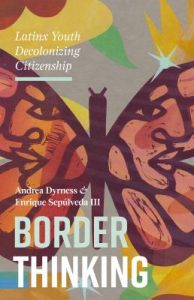
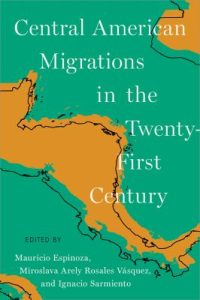 “The reality of Central American migrations is broad, diverse, multidirectional, and uncertain. It also offers hope, resistance, affection, solidarity, and a sense of community for a region that has one of the highest rates of human displacement in the world. Central American Migrations in the Twenty-First Century tackles head-on the way Central America has been portrayed as a region profoundly marked by the migration of its people. Through an intersectional approach, this volume demonstrates how the migration experience is complex and affected by gender, age, language, ethnicity, social class, migratory status, and other variables. Contributors carefully examine a broad range of topics, including forced migration, deportation and outsourcing, intraregional displacements, the role of social media, and the representations of human mobility in performance, film, and literature. The volume establishes a productive dialogue between humanities and social sciences scholars, and it paves the way for fruitful future discussions on the region’s complex migratory processes.”
“The reality of Central American migrations is broad, diverse, multidirectional, and uncertain. It also offers hope, resistance, affection, solidarity, and a sense of community for a region that has one of the highest rates of human displacement in the world. Central American Migrations in the Twenty-First Century tackles head-on the way Central America has been portrayed as a region profoundly marked by the migration of its people. Through an intersectional approach, this volume demonstrates how the migration experience is complex and affected by gender, age, language, ethnicity, social class, migratory status, and other variables. Contributors carefully examine a broad range of topics, including forced migration, deportation and outsourcing, intraregional displacements, the role of social media, and the representations of human mobility in performance, film, and literature. The volume establishes a productive dialogue between humanities and social sciences scholars, and it paves the way for fruitful future discussions on the region’s complex migratory processes.”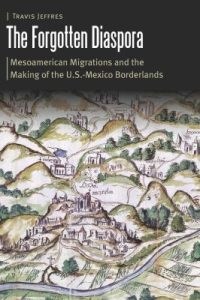 “In The Forgotten Diaspora Travis Jeffres explores how Native Mexicans involved in the conquest of the Greater Southwest pursued hidden agendas, deploying a covert agency that enabled them to reconstruct Indigenous communities and retain key components of their identities even as they were technically allied with and subordinate to Spaniards. Resisting, modifying, and even flatly ignoring Spanish directives, Indigenous Mexicans in diaspora co-created the U.S.-Mexico borderlands and laid enduring claims to the region. Jeffres contends that tens of thousands-perhaps hundreds of thousands-of central Mexican Natives were indispensable to Spanish colonial expansion in the Greater Southwest in the sixteenth and seventeenth centuries. These vital allies populated frontier settlements, assisted in converting local Indians to Christianity, and provided essential labor in the mining industry that drove frontier expansion and catapulted Spain to global hegemony. However, Nahuatl records reveal that Indigenous migrants were no mere auxiliaries to European colonial causes: they also subverted imperial aims and pursued their own agendas, wresting lands, privileges, and even rights to self-rule from the Spanish crown. Via Nahuatl-language “hidden transcripts” of Native allies’ motivations and agendas, The Forgotten Diaspora reimagines this critical yet neglected component of the hemispheric colonial-era scattering of the Americas’ Indigenous peoples”
“In The Forgotten Diaspora Travis Jeffres explores how Native Mexicans involved in the conquest of the Greater Southwest pursued hidden agendas, deploying a covert agency that enabled them to reconstruct Indigenous communities and retain key components of their identities even as they were technically allied with and subordinate to Spaniards. Resisting, modifying, and even flatly ignoring Spanish directives, Indigenous Mexicans in diaspora co-created the U.S.-Mexico borderlands and laid enduring claims to the region. Jeffres contends that tens of thousands-perhaps hundreds of thousands-of central Mexican Natives were indispensable to Spanish colonial expansion in the Greater Southwest in the sixteenth and seventeenth centuries. These vital allies populated frontier settlements, assisted in converting local Indians to Christianity, and provided essential labor in the mining industry that drove frontier expansion and catapulted Spain to global hegemony. However, Nahuatl records reveal that Indigenous migrants were no mere auxiliaries to European colonial causes: they also subverted imperial aims and pursued their own agendas, wresting lands, privileges, and even rights to self-rule from the Spanish crown. Via Nahuatl-language “hidden transcripts” of Native allies’ motivations and agendas, The Forgotten Diaspora reimagines this critical yet neglected component of the hemispheric colonial-era scattering of the Americas’ Indigenous peoples”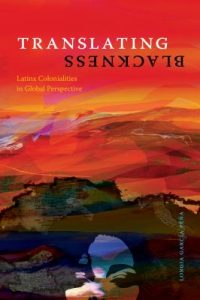 “Translating Blackness examines the relationship between race, migration, and colonialism through the lives, works, and epistemologies of Black Latinx people across diasporas. Lorgia García-Peña presents Black Latinidad as a social, cultural, and political formation that produces new approaches, knowledges, and ways of understanding our present world. Central to Translating Blackness is the concept of vaivén (coming and going). The term vaivén denotes the crossings-forth and back-that shape migrant life and expose the limits of the binary oppositions through which human beings are deployed as either citizens or foreigners. Vaivén also refers to the nations which oscillate between empire and country, receiving or expulsing people from its center. Black Latinx peoples, García-Peña argues, are subjects in vaivén between belonging and unbelonging. Their lived experience reveals that the nation is not a sufficient rubric from which to understand human experiences.”
“Translating Blackness examines the relationship between race, migration, and colonialism through the lives, works, and epistemologies of Black Latinx people across diasporas. Lorgia García-Peña presents Black Latinidad as a social, cultural, and political formation that produces new approaches, knowledges, and ways of understanding our present world. Central to Translating Blackness is the concept of vaivén (coming and going). The term vaivén denotes the crossings-forth and back-that shape migrant life and expose the limits of the binary oppositions through which human beings are deployed as either citizens or foreigners. Vaivén also refers to the nations which oscillate between empire and country, receiving or expulsing people from its center. Black Latinx peoples, García-Peña argues, are subjects in vaivén between belonging and unbelonging. Their lived experience reveals that the nation is not a sufficient rubric from which to understand human experiences.” “What becomes of men the US locks up and kicks out? From 2009 to 2020, the US deported more than five million people-over 90 percent of them men. Banished Men tells 186 of their stories. How, it asks, does forced expulsion shape men’s lives and sense of themselves? In this book, a team of thirty-one Latinx students and an award-winning scholar of gender and migrant exclusion uncover a harrowing system that weaves together policing, prison, detention, removal, and border militarization-and overwhelmingly targets men. Guards and gangs beat them down, both literally and metaphorically, as if they are no more than vermin or livestock. Their ties with family are severed. In Mexico, they end up banished: in limbo and stripped of humanity. They do not go “;home.”; Their fight for new ways of belonging, as people of both “;here”; and “;there,”; forms a devastating, humane, and clear-eyed critique of the violence of deportation.”
“What becomes of men the US locks up and kicks out? From 2009 to 2020, the US deported more than five million people-over 90 percent of them men. Banished Men tells 186 of their stories. How, it asks, does forced expulsion shape men’s lives and sense of themselves? In this book, a team of thirty-one Latinx students and an award-winning scholar of gender and migrant exclusion uncover a harrowing system that weaves together policing, prison, detention, removal, and border militarization-and overwhelmingly targets men. Guards and gangs beat them down, both literally and metaphorically, as if they are no more than vermin or livestock. Their ties with family are severed. In Mexico, they end up banished: in limbo and stripped of humanity. They do not go “;home.”; Their fight for new ways of belonging, as people of both “;here”; and “;there,”; forms a devastating, humane, and clear-eyed critique of the violence of deportation.”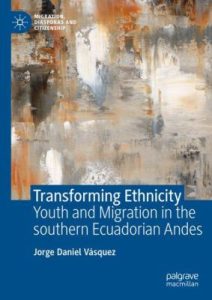 “This book explores how global migration transforms local dynamics in the communal life of indigenous peoples in southern Ecuador. At its heart, the focus is on Cañar, a region marked by more than seven decades of migratory flows to the United States. Cañar features one of the areas of greatest human mobility in the entire Andean Region. Drawing on data from in-depth interviews and dialogue-based workshops with indigenous youths, the author shows how migratory processes and forms of self-representation have challenged the idea that ethnic identity is tied to fixed cultural patterns. He further shows how youths’ transnational experiences reconfigure generational differences within indigenous communities. In analyzing how transnational life, adultcentrism, gender power dynamics, and institutional discourses intersect in the production of indigenous youths’ subjectivities, this book provides an innovative approach to the studies of indigenous peoples and migration.”
“This book explores how global migration transforms local dynamics in the communal life of indigenous peoples in southern Ecuador. At its heart, the focus is on Cañar, a region marked by more than seven decades of migratory flows to the United States. Cañar features one of the areas of greatest human mobility in the entire Andean Region. Drawing on data from in-depth interviews and dialogue-based workshops with indigenous youths, the author shows how migratory processes and forms of self-representation have challenged the idea that ethnic identity is tied to fixed cultural patterns. He further shows how youths’ transnational experiences reconfigure generational differences within indigenous communities. In analyzing how transnational life, adultcentrism, gender power dynamics, and institutional discourses intersect in the production of indigenous youths’ subjectivities, this book provides an innovative approach to the studies of indigenous peoples and migration.”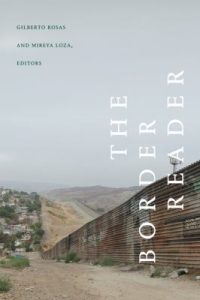 “The Border Reader brings together canonical and cutting-edge humanities and social science scholarship on the US-Mexico border region. Spotlighting the vibrancy of border studies from the field’s emergence to its enduring significance, the essays mobilize feminist, queer, and critical ethnic studies perspectives to theorize the border as a site of epistemic rupture and knowledge production. The chapters speak to how borders exist as regions where people and nation-states negotiate power, citizenship, and questions of empire. Among other topics, these essays examine the lived experiences of the diverse undocumented people who move through and live in the border region; trace the gendered and sexualized experiences of the border; show how the US-Mexico border has become a site of illegality where immigrant bodies become racialized and excluded; and imagine anti- and post-border futures. Foregrounding the interplay of scholarly inquiry and political urgency stemming from the borderlands, The Border Reader presents a unique cross section of critical interventions on the region.”
“The Border Reader brings together canonical and cutting-edge humanities and social science scholarship on the US-Mexico border region. Spotlighting the vibrancy of border studies from the field’s emergence to its enduring significance, the essays mobilize feminist, queer, and critical ethnic studies perspectives to theorize the border as a site of epistemic rupture and knowledge production. The chapters speak to how borders exist as regions where people and nation-states negotiate power, citizenship, and questions of empire. Among other topics, these essays examine the lived experiences of the diverse undocumented people who move through and live in the border region; trace the gendered and sexualized experiences of the border; show how the US-Mexico border has become a site of illegality where immigrant bodies become racialized and excluded; and imagine anti- and post-border futures. Foregrounding the interplay of scholarly inquiry and political urgency stemming from the borderlands, The Border Reader presents a unique cross section of critical interventions on the region.”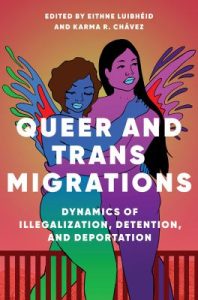 “More than a quarter of a million LGBTQ-identified migrants in the United States lack documentation and constantly risk detention and deportation. LGBTQ migrants around the world endure similarly precarious situations. Eithne Luibhéid and Karma R. Chávez’s edited collection provides a first-of-its-kind look at LGBTQ migrants and communities. The academics, activists, and artists in the volume center illegalization, detention, and deportation in national and transnational contexts, and examine how migrants and allies negotiate, resist, refuse, and critique these processes. The works contribute to the fields of gender and sexuality studies, critical race and ethnic studies, borders and migration studies, and decolonial studies. Bridging voices and works from inside and outside of the academy, and international in scope, Queer and Trans Migrations illuminates new perspectives in the field of queer and trans migration studies.”
“More than a quarter of a million LGBTQ-identified migrants in the United States lack documentation and constantly risk detention and deportation. LGBTQ migrants around the world endure similarly precarious situations. Eithne Luibhéid and Karma R. Chávez’s edited collection provides a first-of-its-kind look at LGBTQ migrants and communities. The academics, activists, and artists in the volume center illegalization, detention, and deportation in national and transnational contexts, and examine how migrants and allies negotiate, resist, refuse, and critique these processes. The works contribute to the fields of gender and sexuality studies, critical race and ethnic studies, borders and migration studies, and decolonial studies. Bridging voices and works from inside and outside of the academy, and international in scope, Queer and Trans Migrations illuminates new perspectives in the field of queer and trans migration studies.”Events in the Library
September 23 (Tuesday), 2:00pm – 4:00pm, University Library: Ferman Presentation Room
Zine-Making for Advocacy and Activism Workshop
Get your message out, and be seen with your zine! Join the Library for a hands-on workshop exploring zine-making as a tool for advocacy and activism. Workshop participants will engage with the radical history of zines, create their own, and gain access to Know Your Rights information along with campus and community resources.
The workshop will focus on how to create zines for activism and advocacy. Register now and start brainstorming issues that you want to advocate for or inform your community about. Our Librarian zine-facilitators will guide you in developing your ideas, gathering information, and designing your self-published zine. But, don’t worry if you don’t have a topic for this theme – ALL zine ideas and interests are welcome. Come, create, connect, and enjoy light snacks while you zine!



